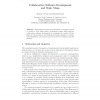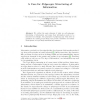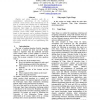TMRA
2005
Springer
13 years 10 months ago
2005
Springer
This work-in-progress report subsumes our ongoing research to develop a Topic Maps centric, modularised system which supports collaborative software development by combining the me...
TMRA
2005
Springer
13 years 10 months ago
2005
Springer
We outline the main elements of what we call polyscopic structuring of information and argue that information needs to be structured accordingly. The principles of polyscopy may bo...
TMRA
2005
Springer
13 years 10 months ago
2005
Springer
Abstract. This paper describes a query algebra for tolog, a query language for Topic Maps inspired by Prolog and very similar to Datalog. The language is based on binding variables...
TMRA
2005
Springer
13 years 10 months ago
2005
Springer
Topic Maps are means for representing sophisticated, conceptual indexes of any information collection for the purpose of semantic information integration. To properly fulfil this p...
ICALT
2005
IEEE
13 years 10 months ago
2005
IEEE
Flexible and active education calls for a comprehensive restructuring of the traditional university course format. Such restructuring can be done in a natural and coherent way by ...
TMRA
2007
Springer
13 years 10 months ago
2007
Springer
Abstract. Topincs provides a RESTful web service interface for retrieval and manipulation of topic maps. A Topincs Server implementing the interface can host many stores, which are...
AIED
2007
Springer
13 years 10 months ago
2007
Springer
The authors of topic map-based learning resources face major difficulties in constructing the underlying ontologies. In this paper we propose two approaches to address this problem...



